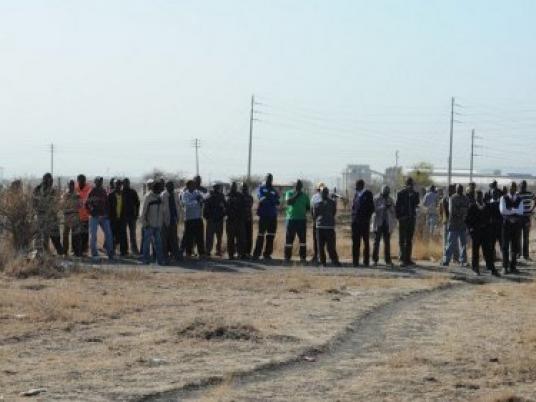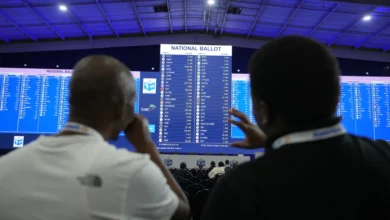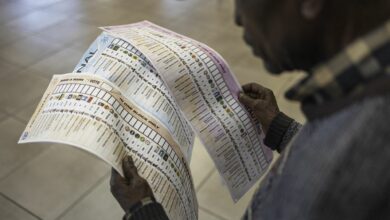
MARIKANA, South Africa — A survivor of last month's police killing of 34 strikers at a South African mine says officers shot fleeing and surrendering men beyond the eyes of the media, challenging police assertions that they fired only in self-defense.
The testimony of Malusi King Danga, a 27-year-old general worker at Lonmin's Marikana mine, sheds light on shootings on a rocky outcrop near the platinum mine on 16 August.
Reuters Television footage of one incident showed nearly a dozen striking miners being cut down in a barrage of automatic weapon fire as they emerged from behind a police vehicle.
The images, relayed around the world, conjured up memories of South Africa's racist past. However, most of the deaths at Marikana, 100 km (60 miles) northwest of Johannesburg, occurred away from the cameras.
Danga was able to tell his story only after being released from three weeks in jail on Thursday. His testimony to Reuters suggests that at least three victims were shot either hiding or fleeing from police, or surrendering to them.
Police spokesperson Dennis Adriao said he could not comment, pending the outcome of a government inquiry. However, Danga's allegations are likely to deepen public anger with the security forces and the ruling African National Congress.
Danga, who left his home five years ago in the impoverished Eastern Cape in search of work, said the shooting began after strikers who had gathered on a rocky hill that served as rally point fled police who were trying to hem them in.
"It was my first day on the hill. I was expecting the employer to address us. I was there for about five minutes and police started putting up the razor wire," he said, speaking before and after a traditional cleansing ceremony close to the scene of the "Marikana massacre."
"People starting running and police fired a shot. I was running away to the informal settlement in the opposite direction and police chased me and said 'Go back to where you came from.' I ran back towards a second hill, a small hill."
"I was so desperate. I didn't know where to go. Police circled the boulders. I ran up and down trying to escape, to take another route. We were trapped. I crouched and hid myself under one of the rocks," he said.
Danga said he belonged to the breakaway militant union AMCU (Association of Mineworkers and Construction Union), which is widely blamed for stirring up violent unrest in South Africa's platinum sector in a turf war for members with the dominant National Union of Mineworkers (NUM).
He gave his testimony in English, which many South African miners — whose languages are mainly Xhosa and Zulu — do not speak well.
“I’m finished”
While in prison, Danga and 269 other miners were charged under an apartheid era law deeming them to have had "common purpose" in the murder of their 34 coworkers. The charges outraged the general public and were dropped three days later.
According to the police version of events laid out in a media presentation on 17 August, officers used non-lethal force to flush out Danga and other men from the rocks and thorny shrubs, and resorted to live ammunition only when they were threatened.
"The police encircled the area and attempted to force the protesters out by means of water cannons, rubber bullets and stun grenades. The militant group stormed towards the police firing shots and wielding dangerous weapons. Police retreated systematically and were forced to utilize maximum force to defend themselves," the police said.
Danga makes no mention of water cannon, tear gas or rubber bullets. He said he was unarmed, but television footage showed hundreds of strikers carrying spears, machetes and clubs. At least one man fired a revolver, a Reuters photographer said.
Danga recalled: "Then I heard the police. I heard a gunshot. An old man was hiding near me. His foot was exposed. I heard another gunshot and I heard him say 'I am finished.' I asked him 'Why do you say you are finished, Madala (grandfather)? Then I saw his boots were full of blood. The old man was shot."
Danga said he did not know what happened to the man.
He then described another striker running towards his hiding place. "I heard a gunshot. It seemed like he was running away. I heard a gunshot and I saw him fall face down. A third man raised his arms to surrender and police shot his hand and then his foot and he lost his balance."
It is not known whether either of these two men survived.
Crouched in a crevice between some rocks, Danga was hidden from policemen combing the scene but thinks officers in a helicopter hovering above may have spotted him. Police on the ground then singled him out by his clothes.
"After the third guy was shot, I waited and I heard the policeman say 'All of those on the ground, come out'. He said: 'You with the shorts and striped t-shirt — get out.'"
"As I was coming up they kicked me in my teeth and one of the gold fillings fell out," he said, lifting his lips to reveal a gap between his front teeth.
Police beating
When the first group of miners was released this week, disturbing claims of beatings and assault emerged. The Independent Police Investigative Directorate said it had received nearly 200 complaints from the arrested miners.
Danga said that four days into his detention in a police station in Bethanie, a town 50 km (30 miles) away, police assaulted the group while searching for a nail they thought was hidden in the cell.
"On Tuesday, they beat us and they beat us. They said they were looking for a nail in the cell. We did not have one," he said, anger and frustration creeping into his voice.
"While they were searching they found a cell phone on one of the guys. They klapped (slapped) him. They kicked him. They stepped on him. We were all there. They did this in front of us. What about his dignity? While they were hitting him, other police were laughing at him.
"Another guy washed his blood-stained clothes. He wrapped himself in a blanket. The police pulled the blanket off him. He was naked and they laughed at him."
When his mother died in 2007, Danga became the family's main breadwinner and headed to the platinum mines near Johannesburg to support his three younger brothers.
After deductions such as tax, a medical levy and pension contributions, Danga said he took home about 3,000 rand (US$360) a month for toiling away as a general worker in stifling conditions hundreds of meters underground.
"I have to pay for my brother who is at university and for another two young boys. I could not afford to keep them in the Eastern Cape so I brought them to Marikana. After everything is paid, I have about 200 rand left," he said.
Danga said he was lucky to be alive but was still haunted by the horrors he had witnessed. "I saw three people being shot and I am disturbed. Every time I close my eyes, I see it again," he said. "God had his hand over me that day. I was spared."




